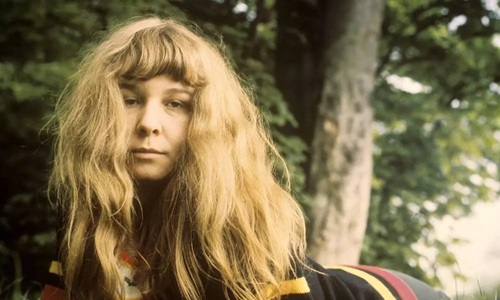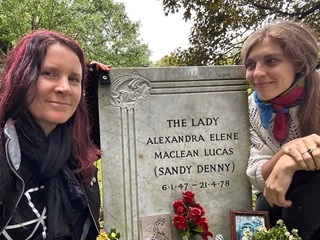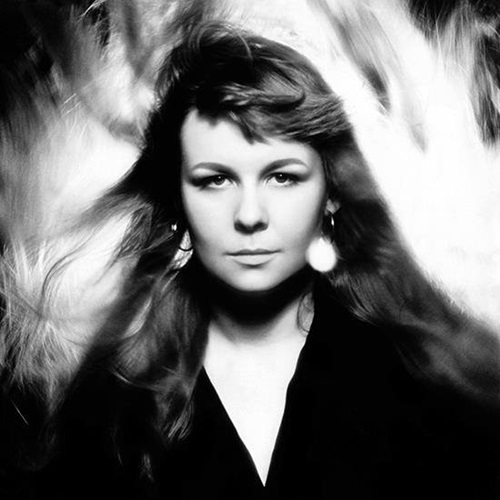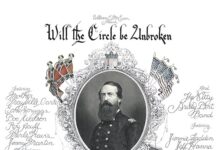Photos courtesy of Georgia Rose Lucas
Ethereal, whimsical, and utterly ahead of her time, Alexandra Elene MacLean “Sandy” Denny was one of the more beautiful and fragile artists to envelop popular music. Like a cautious fawn navigating the natural world, for each bold step forward she would take it would be followed by breathing in her surroundings and contemplating whether to continue onward. If you could see her when she appeared, you simply wouldn’t be able to take your eyes away for they would be locked with hers.
When she smiled, you could feel beams of warmth emanating from her. When she would look directly head-on in a stoic manner — be it on album covers or in promo shots — you could sense she was taking all of you in, seeking to decipher the core of your emotive makeup.
In America, she lacked the attention other parts of the world bestowed upon her but she does hold one untouchable distinction. She remains, to this day, the only other vocalist to share the microphone with Robert Plant while Led Zeppelin was in existence and actually match his vocal intonations and chops.
“First of all, it’s, ‘Have you heard of Sandy Denny?’ And they say, ‘No, I haven’t,’” Denny’s daughter Georgia Rose Lucas told me recently. “Then if they haven’t heard of Sandy, I’ll say, ‘Have you heard of Fairport Convention?’ Sometimes people will say, ‘Yes,’ and I say, ‘Well she sang with them.’ If they don’t get Fairport, then I say, ‘Well do you know Led Zeppelin?’ They always say, ‘Yes,’ and I say, ‘Well she was the only singer to sing with them. She did “The Battle of Evermore.”’ And they go, ‘Oh my god.’ That’s another way they discover her is through (Led Zeppelin IV).”
But I’m using this forum to all but demand that Sandy Denny be recognized and heralded beyond one epic Tolkienian song. Whether fronting British folk powerhouse Fairport Convention or crafting such masterful albums as Sandy (1972) and Like an Old Fashioned Waltz, Denny should easily be regarded as Britain’s Joni Mitchell. I’d even venture to say that Kate Bush’s musical vulnerability is a byproduct of the Sandy Denny songbook. If you want to maximize her impact in terms of originality, pair her with the elusive Nick Drake. Denny tragically died at age 31 in 1978; Drake died in 1974 at age 26.
“I feel that she’s similar to Nick Drake. His life was tragic and he didn’t get discovered until 30 years after which was devastating for him because he wanted to be famous,” said Lucas, 47, a graphic designer and artist based in Sydney, Australia. “I don’t think (my mom) wanted to be famous. I think she just wanted to sing in the folk clubs and live a more simple life. I think she got pushed a little bit to be a bit more commercial.”
It doesn’t take repeat listens of her canon to understand the breadth of Denny’s talents and artistry. Tracks like “Who Knows Where The Time Goes,” “Late November,” “Solo,” “It Suits Me Well,” “Like An Old Fashioned Waltz,” and “I’m a Dreamer” may reflect timidity on their surface but they also exude an authority that makes Denny one-of-a-kind.
Like An Old Fashioned Waltz turns 50 this year and it’s a primer for anyone seeking to learn more about the “legend” that is Sandy Denny. The cover’s antique look and feel is, on the one hand, ironic given the album’s title but it also displays a maturity not readily heard within popular music at the time. The bright “Solo,” the album’s title tune, “At the End of the Day,” “Whispering Grass” ─ all standout tracks. Side surprising note: Emmylou Harris would cover “Like an Old Fashioned Waltz” on her 1983 album White Shoes so if that doesn’t speak to its impact… just saying…
“Everything she’s done is amazing. It’s hard to compare anyone to her,” Lucas adds.
What makes Denny’s tale that much more real and, in aspects, heartbreaking though is the fact that arguably the harshest critic of her work was Denny herself.
“She was very self-conscious, and she didn’t think she was that good — whereas we all know that she was probably one of the best female artists in the world,” Lucas told me. “I think that she’s still underrated. I think that she should have more recognition. Her music is still being discovered. It’s timeless music, it’s never going to get old. It’s always going to be there for a new generation; it’s just getting that new generation to hear it.”

In my own case, it’s also the relatively small treasure trove of videos and footage that contributes to the Sandy Denny mystique. It’s far easier, for example, to find footage of a brooding, intense John Martyn bending guitar notes and his voice to match his feelings. With Denny, there’s more trepidation, but as her confidence grows, so does the range and color in her voice. Her world and her artistry are microcosmic so for those who were able to experience it in real time during her lifetime, consider yourself lucky!
“When people hear my mom for the first time, they go ‘Oh my god’ every single time. No two ways about it,” Lucas says. “Every single time someone hears my mom’s voice it’s an ‘A-ha’ moment for them and they’ve just discovered her.”
For Lucas though, it hasn’t always been easy to fully embrace the fact that she is Sandy Denny’s daughter. Lucas wasn’t even a year old when Denny passed away. Her father, musician, Trevor Lucas, a bandmate of Denny’s in the group Fotheringay, would pass away in 1989 at the age of 45.
Per Lucas: “I didn’t know her. All I’ve got are her diaries and her music.
“I sort of pushed this whole legacy under the carpet because I was so hurt. It was quite tragic. People would always come up to me and say, ‘Your mom was this and I knew her…’ I was really upset about that, and I didn’t want to listen to my mom’s music. If someone wanted to listen to her music, I would pass them a pair of headphones and say ‘Here, you can listen to it on these because I can’t do this or I’ll cry.’ I didn’t understand why people wanted to listen to music that made them cry. Obviously, I didn’t want to deal with that back then.
“I knew that I could access the stories, and I knew I could ask but I didn’t want to hear it for a long time because it was just too painful. I felt ripped off, like both my parents are gone and they just left me. I was very bitter about the whole thing; very sad. I wouldn’t say I was bitter — I just asked the question ‘Why? Why would this happen to me?’”
Lucas quickly adds, “Now I am very much behind my mom’s legacy,” citing a cancer scare she suffered as a key reason for revaluating life and the importance of her mother to both herself and others.
“That’s what came of my cancer journey is to be more involved and let my mom’s legacy in and be part of it,” she says. “(Her) estate was running on a skeleton crew for most of my life and I thought I’d better do something. When you have a near-death experience, you either want to live and fight it or let life go. I wanted to live and fight it. And here I am.
“Before my dad died, I was learning the piano. When he died, it all sort of went away and I got very depressed,” she adds. “I’ve come from a very dark place and I love my life now. I just wish that I had been able to do this sooner but then maybe it wouldn’t have been the same. Because I’m such a stubborn person, I needed to be slapped… My cancer was a strange gift.”
Starting with folk-rock mainstays The Strawbs (of “Lay Down,” “Part of the Union,” and “Grace Darling” fame) and Fairport Convention, Denny would form the short-lived Fotheringay in 1970 before releasing four solo albums between 1971 and 1977. For however much the public may have known about her personality, in private, Denny proved to be just as mystifying.
“I think that she was depressed. She’d had a rough time, I think, with a few things and it came out in her music. Back then everybody was all over the place with everybody and my dad was touring with his band.” Lucas says. “She was left in the Byfield house on her own. Back then we didn’t have that connection with the world and she didn’t like being alone. It was hard for her. It came out in her music.”
For Denny, a key outlet for expression would be her diaries where emotions would pour out on the page in tandem with her lyrical poetry. Its these exclamations, proclamations, and insights that form the basis for a 2023 Sandy Denny tribute album, Songbird, developed by Lucas in tandem with German singer Carla Fuchs.
“You can see in the diaries what sort of mood she was in – whether she was calm or in a good place or if she angry and scribbling,” Lucas said. “One song on the album is called “Simply Falls Apart” and there’s a wine spill on that piece of paper. The way she was writing the lyrics, it was like she was not in a good place. You could tell by the diaries. Her emotions and moods were all over the place in those diaries so the songs that she’s written – I don’t know who writes songs like that.”
While there’s an underlying somberness to Songbird that recalls classic Sandy Denny material, there is a sweetness and beauty that’s undeniable, especially on tracks like “Sixpence,” “If You Are Free,” and “Georgia,” where the lyrics detail her daughter’s interactions with the world how she eagerly awaits the next moments they can be together. Fuchs’ voice eerily recalls Denny’s own, but this is a good thing as it means Denny’s legacy is omnipresent. When Fuchs sings a Denny line like, “And If I don’t make it before I die, I just ain’t gonna die,” you smile because you realize that Sandy Denny was actually a master at conveying strength through song.
Lucas, meanwhile, sums her mother up with the following: “She’s just brilliant in every way.”

***
Share your feedback and suggestions for future columns with Ira at vinylconfessions84@gmail.com. Ira’s book, “Hello, Honey, It’s Me”: The Story of Harry Chapin, is available for purchase here.




















